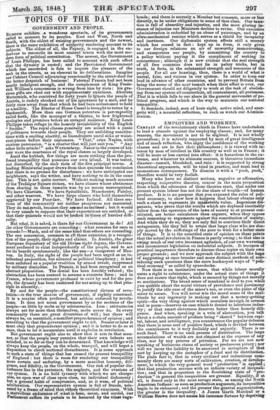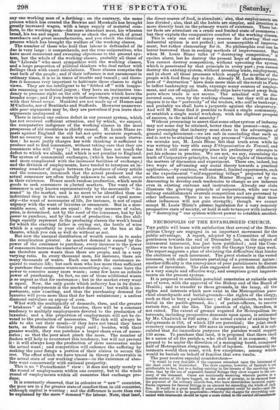EMPLOYERS AND WORKMEN.
CERTAIN of the revolutionary chiefs in France have undertaken to lead a crusade against the employing classes; and, for many reasons, the movement is not to be slighted. It is not wholly groundless; it is actively supported by men of great intelligence and of much reflection, who enjoy the confidence of the working classes and are in fact their philosophers ; it is viewed with in- terest by men of intellect in this country as well as in France ; it will be more or less carried into effect: it is hazardous in the ex- treme, and whatever its ultimate success, it threatens immediate disaster—tumult, bloodshed, and ruin : it is supported by strong theoretical arguments, will be tried in practice, and must lead to momentous consequences. To dismiss it with a "pooh, pooh," therefore would be very foolish. Many who have no distinct notions, negative or affirmative, respecting cooperative theories, concur in the main proposition from which the advocates of those theories start, that under our present system labour has not its due share of wealth—of human produce. It is,to no purpose that you expound the rules of poli- tical economy, to show how it happens that labour obtains only such a share as represents its marketable value. ingenious dis- putants, who prove that the results which are deplored inevitably follow from the operation of the laws of society as at present con- stituted, are better calculators than arguers, when they oppose such reasoning to arguments against the constitution of society. And while they do so, they not only fail to convince their direct antagonists, but they fail to retain that large class who are sim- ply moved by the sufferings of the poor to wish for a better state of things. It is to the unsettled state of opinion on these points that the actual revolution in France is partly owing ; to that also is owing much of our own incessant agitation, ofseir own wavering and inconsistent legislation on industrial subjects. It becomes of practical importance therefore to discuss these topics on their own proper grounds ; and we now approach the subject with the •htp. of suggesting at once broader and more distinct methods of co& sidering such questions than the mere hackneyed ways of "
tical economy " so called by synecdoche.
Now there is an instinctive sense, that while labour morally earns a right to subsistence, under the actual state of things it does not secure that right, which is secured by things not morally so meritorious. The broad sense of mankind is deaf to you while you quibble about the social virtues of providence and parsimony to justify the idle ease of the miser's son, or even the pains of the miser to amass. You will never win the moral sense of the mul- titude by any ingenuity in making out that a money-getting spirit—the very thing against which moralists inveigh in sermon and in poem—deserves an ease whichis denied to laborious indus- try; or that smart cleverness deserves better than homely-dili- gence. And when, speaking in a vein of abstraction, you talk about a certain amount of produce being " shared" between capi- tal, labour, and intelligence, you countenance the popular delusion that there is some sort of positive fund, which is divided between the contributors to it very foolishly and unjustly. There is no such fund. There is no such process of distribution. The large accumulations of wealth are not obtained at the expense of any class, nor by any process of privation. For we are not now speaking of barbarous states of society or predaceous piracy; nor will we incur the liability to be answered in metaphors of that sort by keeping. up the metaphor of a fund and its distribution. The plain fact is, that in every civilized and industrious com- munity there are many sorts of cultivation, creation or develop- men; to which the very general word " production'; is applied. ; that that production accrues with an infinite variety of inequali- ties; and that in proportion to the flourishing state of "pro- duction " in general the inequalities are greater. Equality, if at all, is found only in the most savage state, as among the North American Indians: as soon as production augments, its inequalities begin to be enhanced ; and the greater the general augmentation, the greater is the inequality. A James Garth Marshall or a William Brown does not amass his immense fortune by depriving
any one working man of a farthing : on the contrary, the same process which has created the Browns and Marshalls has brought greatly increased wages, with a large supply of material com- forts, to the working man—his more abundant meat, his wheaten bread, his tea and sugar. Destroy or check the growth of great merchants and great manufacturers, and you check the identical process which has brought the welfare of the working classes.
The number of those who hold that labour is defrauded of its due is very large : it comprehends, not the true cooperatives, who have more consistent and sweeping objections to the present sys- tem, but the whole of the working classes, probably all those of the "Liberals" who most sympathize with the working classes, and a large proportion of political thinkers who deal rather with feelings than with exact calculations. These classes comprise the vast bulk of the people; and if their influence is not paramount in ordinary times, it is so in times of trouble and tumult ; But now the unequal distribution of wealth comes in to make the complication greater. As market demand is caused by the power of the consumer to purchase, every increase to the power of consumers increases the number of commercial "wants": there are therefore more wants than there are people, and in a very varying ratio. In every thousand men, for instance, there are many thousands of wants. Each one needs the sustenance re- quired to sustain life; but each man who has more than sufficient to purchase that sustenance wants something else; some have the power to conceive many more wants ; some few have an infinite power of purchasing. In fact, no one of those additional wants Is so urgent as that for sustenance ; but in the market every want is equal. Now, the only guide which industry has in its distri- bution of employments is the market demand : but wealth is im- portunate, ease exacting, and thus the purchasing demand for luxuries will press more than that for bare subsistence; a useless diamond outvalues an argosy of corn. What with the multiplicity of demands, then, and the greater " briskness " of demands for luxuries, there will be a constant tendency to multiply employments devoted to the production of luxuries; and a due proportion of employments will not be de- voted to the production of necessaries. The rich will always be able to eke out their meals—if they have not bread they have tarts, as Madame de Geniis's pupil said ; besides, with their greater wealth, they can purchase a larger share even of neces- saries; so that the poor must pinch the more. The number of feeders will help to counteract this tendency, but will not prevent it : it will always keep the production of mere necessaries under the actual want ; and competition will enhance the suffering by making the poor forego a portion of their claims to secure the rest. The effect which we have traced in theory is observable in the actual state of our working classes—in the existence of abso- lute want concurrently with national prosperity. This is no " Protectionist " view : it does not apply merely to the round of employments within one country, but to the whole round of employments within all countries that exchange pro- duce. It is constantly observed, that in colonies or " new " countries, the poor are in a far greater state of comfort than in old countries, although capital is wanting : and the difference is more than can be explained by the mere " demand" for labour. Note, that land, the direct source of food, is abundant; also, that employments are less divided ; also, that all the habits are simpler, and attention is more directly bent on the primary wants of existence. These lat- ter facts are attendant on a crude and limited state of commerce : but they explain the comparative comfort of the working classes. This is only one out of many reasons for showing that our industrial system is not perfect; not unsusceptible of improve- ment, but rather clamouring for it. No philosophic zeal can be better bestowed than in seeking methods of improvement. But when M. Louis Blanc talks of " destroying competition," it excites alarm lest he destroy the present hope of improvement. You cannot destroy competition, without uprooting the system which is penetrated by that principle in every part ; you cannot destroy the existing system, without arresting trade, employment, and in short all those processes which supply the mouths of the people with food from day to day. Already M. Louis Blanc's pro.. jects of " destruction " have done more than all the revolt in Paris to inflict bankruptcy on trade, expunge many sources of employ.. ment, and cut off supplies. Already ships have turned away from ports where trade is not secure. The mischief will be dis- covered soon, even by the working classes; but they will at first impute it to the " perversity" of the traders, who mill be bankrupt; and probably we shall have a jacquerie against the shopocracy. And will M. Blanc find it possible to found a single community, or establish a single social workshop, with the slightest prospect of success, in the midst of anarchy ? Without presuming to assert that some other system of industry may not some day be attained, better than the present—nay, ra- ther presuming that industry must share in the advantages of general enlightenment—we are safe in concluding that such an end is not to be attained through any process of "destruction." If we mistake not, M. Louis Blanc felt that truth even while he was writing his very able essay L'Organizetion du Travail, and has felt it still more strongly since his preliminary attempts to put his scheme in practice. We are not, we say, examining the truth of Cooperative principles, but only the rights of theorists in the matters of discussion and experiment. There are, indeed, but two ways of advancing any social theory towards a practical application,—by cautious, well-matured, limited experiments, such as the experimental "self-supporting village" projected by the reflective and conscientious John Minter Morgan ; or by en- deavouring to develop such tendencies to change as are inherent even in existing customs and institutions. Already our clubs illustrate the growing principle of cooperation, while our vast railway establishments overrule competition and are governed by other influences. There is no reason for presuming that those other influences will not gain strength ; though we cannot accept M. Louis Slatic's present legislation for a very remotely prospective state of society, or hold it safe to tamper with industry by " destroying " one system without power to establish another.



























 Previous page
Previous page